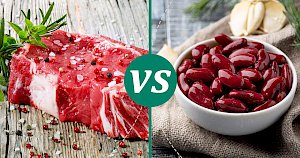Kidney Beans vs Beef: Calories & Nutrition Showdown


Kidney beans vs Beef
Nutrition Facts
Serving size:
change
5g10g15g20g30g40g50g60g80g100g120g140g160g180g200g220g250g300g350g400g450g500g600g700g800g900g1000g
1oz2oz3oz4oz5oz6oz7oz8oz10oz12oz15oz20oz25oz30oz35oz40oz50oz
Amount Per Serving:
Serving size:
change
5g10g15g20g30g40g50g60g80g100g120g140g160g180g200g220g250g300g350g400g450g500g600g700g800g900g1000g
1oz2oz3oz4oz5oz6oz7oz8oz10oz12oz15oz20oz25oz30oz35oz40oz50oz
Amount Per Serving:
Kidney Beans vs Beef 100g Compare
| per 100g | Kidney beans | Beef |
|---|---|---|
| Calories | 333 | 250 |
| Fat | 0.83 g | 15.41 g |
| Protein | 23.58 g | 25.93 g |
| Water | 11.75 g | 57.98 g |
| Calcium | 143 mg | 18 mg |
| Iron | 8.2 mg | 2.6 mg |
| Magnessium | 140 mg | 21 mg |
| Potassium | 1406 mg | 318 mg |
| Sodium | 24 mg | 72 mg |
| Vitaminium B1 (Thiamine) | 0.529 mg | 0.046 mg |
| Vitaminium B2 (riboflavin) | 0.219 mg | 0.176 mg |
| Vitaminium B3 (Niacin) | 2.06 mg | 5.378 mg |
| Vitaminium B6 | 0.397 mg | 0.382 mg |
| Vitaminium B9 (Folic acid) | 0.394 mg | 0.009 mg |
| Vitaminium E | 0.22 mg | 0.12 mg |
| Vitaminium K | 0.019 µg | 0.001 µg |
When it comes to choosing between kidney beans and beef, many might think it's simply a matter of preference between plant-based and animal-based proteins. However, delving into the nutritional content and health benefits of each reveals a fascinating comparison that might influence your decision the next time you're planning a meal. Let's explore some interesting facts about kidney beans and beef, and see how they stack up against each other in terms of nutrition and health benefits.
The Mighty Kidney Bean
Kidney beans, named for their visual resemblance to the human kidney, are not only a staple in chili dishes but also a powerhouse of nutrition. They are rich in complex carbohydrates, fiber, and protein, making them an excellent choice for those looking to maintain a healthy diet. With a whopping 24.9 grams of fiber per serving, they are fantastic for digestive health and for keeping you feeling full longer. Moreover, kidney beans are a great source of minerals such as iron, magnesium, and potassium, which are vital for bodily functions. Their impressive nutrient profile doesn't stop there; they also offer a good amount of vitamins, including vitamin C and several B vitamins.
Beefing Up the Facts
Beef, on the other hand, is often celebrated for its high protein content and its role as a primary source of iron and B vitamins, particularly B12, which is less readily available in plant-based foods. It's a versatile meat that can be prepared in countless ways, from grilling and roasting to slow-cooking and stewing. Beef also contains significant amounts of zinc and selenium, minerals important for immune function and antioxidant defense, respectively. However, it's worth noting that beef is higher in saturated fats and cholesterol, which are linked to heart disease when consumed in excess.
Comparing the Nutritional Profiles
When we compare the nutritional data head-to-head, both kidney beans and beef offer unique benefits. Kidney beans, with zero cholesterol and less than 1 gram of fat per serving, are an excellent heart-healthy choice. They also surpass beef in fiber content, which is non-existent in beef, and provide more than five times the amount of iron. On the other hand, beef edges out slightly higher in protein and provides a more bioavailable form of iron, making it a potent choice for muscle building and maintenance.
One of the most striking differences is in the micronutrient content. Kidney beans offer a broader spectrum of vitamins, including a significantly higher amount of vitamin C and most B vitamins, except for B3 (niacin), where beef takes the lead. Beef, however, is a better source of minerals like zinc and phosphorus. It's also worth mentioning that beef contains more water, contributing to its lower calorie count per serving compared to kidney beans.
Which One Should You Choose?
The choice between kidney beans and beef might come down to dietary preferences, ethical considerations, or specific nutritional needs. For those looking to reduce fat intake and increase fiber, kidney beans are an unbeatable choice. They're also ideal for vegetarians and vegans seeking high-quality plant-based protein. Beef, with its high protein and mineral content, might be preferable for those focusing on muscle building or who require a higher intake of bioavailable iron and B12.
In the end, both kidney beans and beef have their place in a balanced diet. Incorporating a variety of foods is key to achieving a wide range of nutrients, so why not enjoy both? A chili made with lean beef and kidney beans, for example, combines the best of both worlds, offering a delicious and nutritious meal that takes advantage of the unique benefits each has to offer.
Kidney beans 100g
333kcalCalories source
- 70% CARBS.
- 28% PROTEIN
- 2% FAT
Compares of kidney bean
- Kidney Beans vs Fava Beans
- Kidney Beans vs Lima Beans
- Kidney Beans vs Lentil
- Kidney Beans vs Black Beans
- Kidney Beans vs Pinto Beans
- Kidney Beans vs Black Eyed Peas
- see all compares of kidney beans
Compares of beef
Read also:
- Calories from Kidney beans
- Calories of Baking powder
- Calories in Potato soup
- Ham salad calories per 100g
- Ravani cake protein per 100g
- How many calories does cream cheese have?
- Calories in a half of croutons
- Calories in whole croutons
- Calories for one, two or more croutons
- Calories in handful of croutons
- Calories in tablespoon of croutons
- How much protein in enchilada?
Marcin Piotrowicz
calories-info.com creator
Healthy diet and healthy lifestyle promoter
Add comment